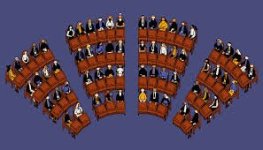Neighboring political options debate
By: Amit Bhushan Date: 1st Oct. 2016
There are quick fix solutions being dished out. We have some of the democratic leaders deliberating on security’s ‘response’ to the changed scenarios. This is at the same time when some others may prefer to weigh democratic set up itself, as a choice of governance of the geography. This is while some of the leaders may be seriously looking weighing upon geographical ‘secessionism’, nature of federalism and socio-economic factors, religious-cultural factors amongst others. What is likely to soon become plainly obvious is that spread of rancor amongst masses through high decibel noise is most likely to fail as a political strategy unless the real ‘needs’ of masses around food, clothing, shelter, education, jobs and better infra is being addressed.
The establishment might have succeeded so far to maintain a largely agrarian economy with dominance/stewardship of monied traders and lenders, their backing to army and sectarian forces in order to keep their own operations away from scrutiny. With changing macro-economic scenarios, whereby which former dominant economies might be ceding some of their capabilities to other dominant challengers, it might be time perhaps to evaluate options to develop domestic capabilities in the manufacturing and services (exports) sectors. This might be a move away from simple processing of commodities & labour intensive sector and a buildup of support infrastructure. The necessary mindset change to attract investments might itself lead to a smoking out of past mindsets which nurtured sectarianism.
What is currently being depicted is that old mindsets seem to be belligerent to maintain their hold on power and a rather lack of ‘leaders’ siding towards to the new mindset probably out of fear or ‘solidarity’ with nationalistic pride being drummed up. While there has been some ‘movements’ for change in the pat as well, however almost always the nationalism debates tend to be led by irrational bigoted netas who have been at forefront to maintain their own hegemony in conjunctions with ‘corrupt rajneta/s’, but have gone rather unchallenged so far. Regards our own commercial news media, it would rather like the focus to remain on Cine Artists and their pranks rather to ensure continuity of ‘old and recyclable stories’ rather than analyzing the change or scope hereunder.
A key challenge within the domestic arena has been for liberal parties (GOP included) to assert themselves while such challenges are seen. If and when such challenges are responded, usually they may be emanating from sources where there is clearly something to grind or playing to some lobbies other than liberal ‘lobby’(which is usually presumed to be non-existent except when they assume the shape of ‘game’ and start taking decisive positions almost single-handedly sealing fate of electoral battles. The liberal appeal is usually not responded by liberals elsewhere who are again subsumed by the narrow political lobbies within the other geographies. Let’s see if this is changing as the ‘game’ evolves…
By: Amit Bhushan Date: 1st Oct. 2016
There are quick fix solutions being dished out. We have some of the democratic leaders deliberating on security’s ‘response’ to the changed scenarios. This is at the same time when some others may prefer to weigh democratic set up itself, as a choice of governance of the geography. This is while some of the leaders may be seriously looking weighing upon geographical ‘secessionism’, nature of federalism and socio-economic factors, religious-cultural factors amongst others. What is likely to soon become plainly obvious is that spread of rancor amongst masses through high decibel noise is most likely to fail as a political strategy unless the real ‘needs’ of masses around food, clothing, shelter, education, jobs and better infra is being addressed.
The establishment might have succeeded so far to maintain a largely agrarian economy with dominance/stewardship of monied traders and lenders, their backing to army and sectarian forces in order to keep their own operations away from scrutiny. With changing macro-economic scenarios, whereby which former dominant economies might be ceding some of their capabilities to other dominant challengers, it might be time perhaps to evaluate options to develop domestic capabilities in the manufacturing and services (exports) sectors. This might be a move away from simple processing of commodities & labour intensive sector and a buildup of support infrastructure. The necessary mindset change to attract investments might itself lead to a smoking out of past mindsets which nurtured sectarianism.
What is currently being depicted is that old mindsets seem to be belligerent to maintain their hold on power and a rather lack of ‘leaders’ siding towards to the new mindset probably out of fear or ‘solidarity’ with nationalistic pride being drummed up. While there has been some ‘movements’ for change in the pat as well, however almost always the nationalism debates tend to be led by irrational bigoted netas who have been at forefront to maintain their own hegemony in conjunctions with ‘corrupt rajneta/s’, but have gone rather unchallenged so far. Regards our own commercial news media, it would rather like the focus to remain on Cine Artists and their pranks rather to ensure continuity of ‘old and recyclable stories’ rather than analyzing the change or scope hereunder.
A key challenge within the domestic arena has been for liberal parties (GOP included) to assert themselves while such challenges are seen. If and when such challenges are responded, usually they may be emanating from sources where there is clearly something to grind or playing to some lobbies other than liberal ‘lobby’(which is usually presumed to be non-existent except when they assume the shape of ‘game’ and start taking decisive positions almost single-handedly sealing fate of electoral battles. The liberal appeal is usually not responded by liberals elsewhere who are again subsumed by the narrow political lobbies within the other geographies. Let’s see if this is changing as the ‘game’ evolves…

